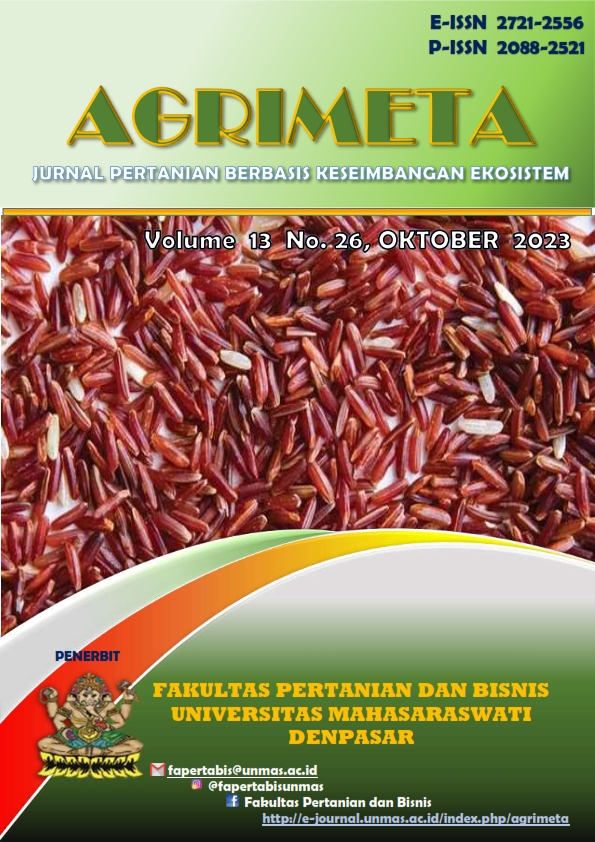Pengaruh Pemberian Pupuk Organik Kotoran Kambing Terhadap Pertumbuhan Dan Hasil Tanaman Seledri (Apium Graveolens L.)
Keywords:
Goat Manure, Organic Fertilizer, Celery, DosageAbstract
Celery (Apium Graveolens L.) belongs to the important leaf vegetable group and has export value and is the second important spice plant after lettuce in terms of its popularity and value. Even today it has been used as a diet food and is always available throughout the year. But the cultivation of celery plants has not received serious attention. This is due to several factors, including the lack of public interest in celery cultivation. Therefore, research on the application of goat manure organic fertilizer on the growth and yield of celery (Apium Graveoluns L.) aims to determine the effect of giving goat manure organic fertilizer on the growth and yield of celery plants, and to determine the appropriate dose of goat manure organic fertilizer. the best effect on the growth and yield of celery plants. This study used a randomized block design (RBD) method with 6 treatments, with doses of goat manure organic fertilizer K0 (control), K1 12.5 grams, K2 25 grams, K3 37.5 grams, K4 50 grams, and K5 65.5 grams. Each treatment was repeated four times so that all treatments became 24. In testing the effect of organic goat manure on growth and yield of celery (Apium Graveolens L.) dose of 37.5 grams (K3) gave the best growth results for all parameters observed, namely plant height (cm), number of leaves (strands), root length (cm), root fresh weight (g), root dry weight (g), total plant fresh weight (g), total plant dry weight (g).
Downloads
References
Arzi, M., Al-Awisi, H., Al-Rasbi, S., El-Shafie, K., Al-Hinai, M., Al-Habsi, H., & Al-Moundhri, M. (2014). Psychosocial impact of breast cancer diagnosis among Omani women. Oman Medical Journal, 29(6), 437–444. https:// doi.-org/10.5001/omj.2014.115.
Fazal, dan Singla R.K., 2012. Review on the Pharmacognostical & Pharmacological Cha-racterization of Apium Graveolens Linn, India
Jung, H. A., Su, B. N. Keller, W. J. Mehta, R. G. Kinghorn, A. D. Antioxidant Xanthones from The Pericarp of Garcinia mangostana (Mangos-teen). J Agric. Food. Chem. 2006, 54, 2077-2082
Musakar dan Nuryanto. 2012. Pengaruh Pemberian Air Rebusan Seledri Terhadap Penurunan Tekanan Darah Pada Penderita Hipertensi. Pemba-ngunan Manusia. Volume 6. No 1
Pamungkas, Saktiyono Sigit Tri dan Pamungkas Eky. 2019. Pemanfaatan Limbah Kotoran Kambing sebagai tambahan pupuk organik pada pertumbuhan bibit Kelapa Sawit (elaeis guine-ensis jacq.) di prenursery. Media Agro.
Robiatul Adawiyah & Musadia Afa. 2018. Pertum-buhan tanaman seledri (apium graveolens l.) pada berbagai media tanam tanpa tanah dengan aplikasi pupuk organik cair (poc). Biowal-lacea. Kendari Vol. 5 (1), Hal : 750-760
Safei, Muhammad, Rahmi Abdul, dan Noor Jannah 2014. Pengaruh jenis dan Dosis Pupuk Organik terhadap Pertumbuhan dan Hasil Tanaman Terung.(Solanum Melongena L.) Varietas Mustang F-1. Agrifor. Universitas 17 Agustus 1945 Samarinda. Samarinda. Volume Xiii Nomor 1
Setiawati Tia, Ela Karima, Titin Supriatun. 2017. Aplikasi Kotoran Hewan (Kohe) Kambing dan Mulsa Serasah Daun Bambu untuk meningkatakan pertumbuhan tanaman seledri. Edumatsains. Sumedang. Universitas Padjajaran. Vol.2. No.1
Surya, R.E., Suryono. 2013. “Pengaruh Pengomposan terhadap Rasio C/N Kotoran Ayam dan Kadar Hara NPK tersedia serta Kapasitas Tukar Kation Tanah”. UNESA. Surabaya. Journal of Chemistry. hal: 137-144






